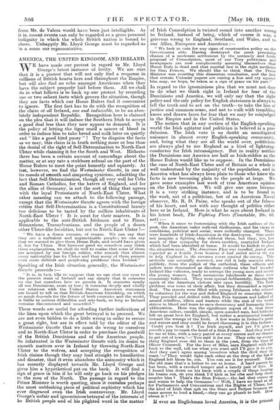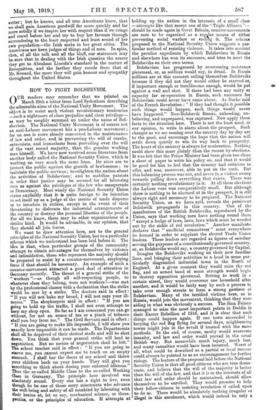AMERICA, THE UNITED KINGDOM, AND IRELAND.
AVE have made our protest in regard to Mr. Lloyd George's latest instance of levity. We are sure that it is a protest that will not only find a response in millions of British hearts here and throughout the Empire, but will also find an echo amongst Americans when they have the subject properly. laid before them. All we shall do in what follows is to back up our protest by recording one or two salient fasts which govern the situation, though they are facts which our Home- Rulers find it convenient to ignore. The first fact has to do with the recognition of the claim of all Ireland, one and indivisible, to be an abso- lutely independent Republic. Recognition here is claimed on the plea that it will induce the Southern Irish to accept a good deal less than they now appear to demand. It is the policy of letting the tiger smell a saucer of blood in order to induce him to take bread and milk later on quietly and " like a good kind pussy " I Try to disguise the facts as we may, this claim is in truth nothing more.or less than the denial of the right of Self-Determination to North-East Ulster while claiming it for the South and West. Hitherto there has been a certain amount of camouflage about the matter, or at any rate a stubborn refusal on the part of the Home Rulers to meet the point honestly and squarely. At teat, however, we find the Westminster Gazette, in one of its moods of smooth and simpering cynicism, admitting the fact that Self-Determination, though all very well for Celts and Roman Catholics, for the haters of England, and for the allies of Germany, is not the sort of thing that agrees with the loyal Protestants of North-East Ulster. What other meaning can we attach to the following passage, except that the Westminster Gazette agrees with the foreign critics that Self-Determination is a Constitutional luxury too delicious to be tasted by the million inhabitants of North-East Ulster ? It is meat for their masters. It is applicable to the anti-British Irishmen and to Finns, Rumanians, Transylvanians, and the people of a dozen other Ulster-like localities, but not to North-East Ulster !-- " We have a dozen excuses, of course. We can say that they are a turbulent and impracticable people ; we can say that we wanted to give them Home Rule, and would have given it, but for Ulster. But however good we ourselves may think these explanations, we shall do well to realise that none of them are accepted by our foreign critics, who remark that almost every nationality has its Ulster and that many of them present even more difficult and perplexing problems than Ireland."
Speaking of the Irish situation generally, the Westminster Gazette proceeds :-
" It is, in fast, idle to suppose that we can shut our eyes to the present state of Ireland and say simply that it concerns no one but ourselves how we govern it. It concerns nearly all our Dominions, more or less ; it concerns deeply and vitally our relations with the United States. American statesmen are bound to tell us that British-American friendship, on which so much depends for the future of both countries and the world, is liable to serious difficulties and sets-back, so long as Ireland remains discontented and unsettled."
These words are useful for affording further indications of the lines upon which the great betrayal is to proceed. We are not even bidden to do a little wrong in order to secure a great right, but are in effect told 'by the editor of the Westminster Gazette that we must do wrong to ourselves and to North-East Ulster in order to purchase the goodwill of the British Dominions and of the American people. So infatuated is the Westminster Gazette with its desire to smooth matters over in Ireland by throwing North-East Ulster to the wolves, and accepting the recognition of Irish claims though they may lead straight to humiliation and disaster, that it even abandons the animosity which it has recently displayed towards Mr. Lloyd George and gives him a hypothetical pat on the back. It will find a sign of grace in him if he will only go back on his pledges to the men of the North. The passage in regard to the Prime Minister is worth quoting, since it contains perhaps the most unblushing piece of political sophistry which has ever disgraced even the Irish controversy. Mr. Lloyd Georges unfair and ignominious betrayal of the interests of he British people and of his plighted word in the matter
of Irish Conscription is twisted round into another wrong to Ireland, instead of being, which of course it was, a grievous wrong to England, Scotland, and Wales, and to our Allies, European and American :—
" We look in vain for any signs of constructive policy on the Government side: Having destroyed the meet promising chance of a moderate settlement by the untimely and futile proposal of Conscription, most of our Tory politicians and newspapers are now complacently assuring themselves that Home Rule is dead and that martial law is the right medicine for Sinn Feiners. We should like to think that the Prime Minister was resisting this disastrous conclusion, and the foot that certain Unionist papers are raising a hue and cry against him may, we hope, be taken as a sign of grace en his part."
In regard to the ignominious plea that we must not dare to do what we think._ right in Ireland for fear of the Dominions- and America, we will only say that the right policy and the safe policy for English statesmen is always to tell the truth and to act on the truth—to take the line of justice and common-sense, and not to walk with trembling knees and drawn faces for fear that we may be misjudged in the Empire and in the United States.
The notion that in any section of the English-speaking world the Irish agitator and politician is beloved is a pure delusion. The Irish vote is no doubt an unmitigated nuisance in almost every English-speaking community, and, being. what they are all the world over, politicians are always glad to use England as a kind of lightning- conductor for Irish intransigency. But in reality neither the Dominions, nor America are half so Irish-ridden as the Home Rulers would like us to suppose. In the. Dominions the case of North-East Ulster and of Britain as a whole is well understood by the majority of the population, and in America what has always been plain to those who knew the facts is now becoming plain to the people at large. We gave some examples last week of true American opinion on the Irish question. We will give one more because it is a very striking instance, and is to be found in the work, not of a politician, but of an American Naval observer, Mr. R. D. Paine, who speaks out of the fulness of his heart, and not with any thought of politics either here or in Ireland. Here is what he says about Ireland in his latest book, The Fighting Fleets (Constable, 10s. 6d. net) :- " When it came to fraternizing with the Irish natives of the port, the American sailor suffered disillusions, end his views of conditions, political and social, were radically changed. There were hundreds of Irish-Americans in the- destroyers. One could not imagine a fighting ship without them, but they, too, lost much of that sympathy for down-trodden, martyred Ireland which had been absorbed at home. It would be foolish to glue the situation over. The American Fleet was insulted, jeered, and regarded as a hostile Jerre because it had sailed acres. the sea to help England in the common cruse against the enemy. This attitude was naturally resented, nor did it help matters when publicly, from the pulpit of the cathedral, these officers and
sailors were denounced as dissolute ruffians who had invaded Ireland like vultures, ready to corrupt the young men and ravish the young women. Such monstrous falsehoods as these were commonly believed. They were spread deliberately, flaming the spirit of the American visitors into open hostility. The Irish .
problem was none of their affair, but they demanded a square deal. The streets were filled with young Irishmen who refused
to volunteer for the war and defied England to conscript them. They paraded and drilled with Sinn Fein banners and talked of armed rebellion, idlers and wasters while the rest of the world strove in blood and tears to save democracy and humanity from obliteration. Here was the significant aspect of it, that these American sailors, candid, simple, open-minded men, had hitherto felt no great love for England, but rather a sentimental leaning toward the wrongs of the Irish. A few weeks in Ireland's ports and waters and they could be heard discussing it in this fashion: Could you beat it ? I'm Irish myself, and yet I'd give a month's pay to crack the head of a Sinn Feiner. And they won't let me at him, with a navy patrol at every corner and no chance to get out of town.'—' You said it for me. They rake up every' thing England ever did to them in the peat, from the time of Oliver Cromwell. For the love of Mike, says Fngland with her back to the wall, toll me what you want and I'll give it to you- And they can't agree among 'emselves what the devil they do want.'—` They would fight each other at the drop of the hat if England.left them be, son. You can see it for yourself. Take the old man that's a father to me at borne. A hard parent he
has been, with a crooked temper and a handy pair of fists. 11
I found him down on his back with a couple of thugs beating his brains out, do you think I'd !tick in his ribs and help them murder. him ? That's the Sinn Feiner,—the lad that curses es and wants to help the Germans.'—' Well, I have no bead at all for Parliaments and Conventions and the Rights of Ulster, hut the kind of Irish that spit on the Stars and Stripes because we came across to lend a hand,—they can go plumb to hell. Hew about it ? ' "
If ever an Englishman loved America, it is -the present writer ; but he knows, and all true Americans know, that we shall gain American goodwill far more quickly and far more solidly if we inspire her with respect than if we cringe and crawl before her and try to buy her favours through surrendering to the least respected and least sound of her own population—the Irish mobs in her great cities. The Americans are keen judges of things and of men. In spite, then, of all the talk and all the bluff, our statesmen may be sure that in dealing with the Irish question the nearer they get to Abraham Lincoln's standard in the matter of Recognition, and the farther they recede from that of Mr. Seward, the more they will gain honour and sympathy throughout the United States.







































 Previous page
Previous page